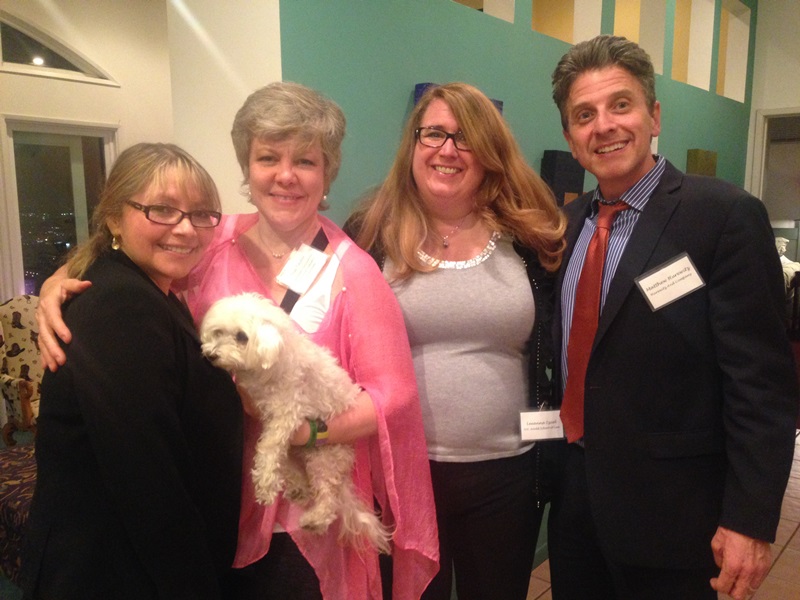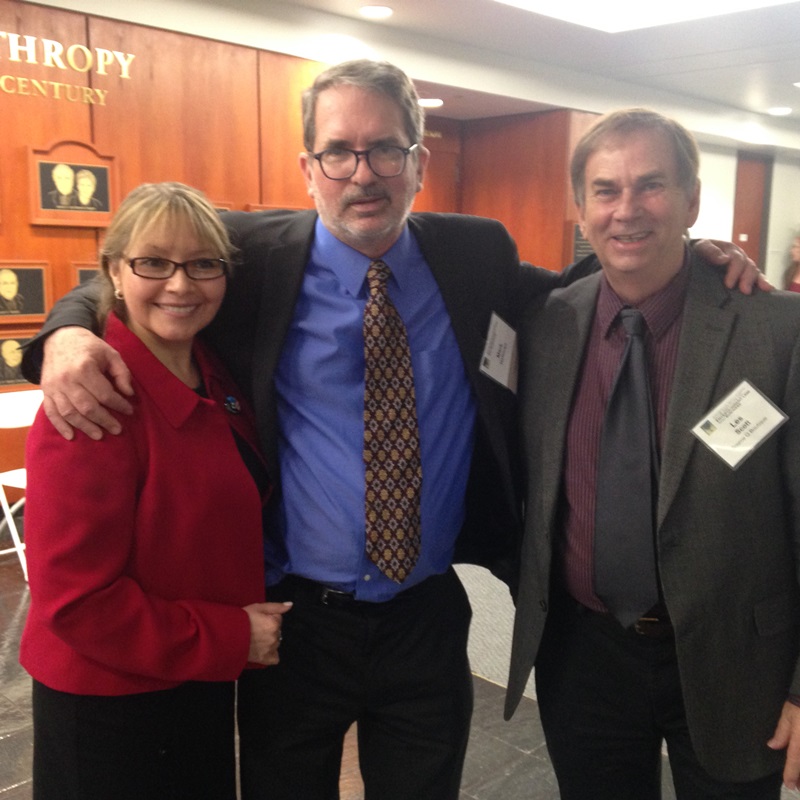Recap of 2016 Institute on Entertainment Law & Business by Lee Morin, Esq.
The 2016 Institute on Entertainment Law & Business, produced every fall by the Beverly Hills Bar Association and the USC Gould School of Law, takes place on the USC campus. The National Association of Record Industry Professionals (NARIP) is an event sponsor, and as a board member of NARIP’s Atlanta chapter, I attended for the first time. This year’s theme was Above and Beyond: The Transforming World of Entertainment and featured Netflix COO, Ted Sarandos, as the keynote speaker.


The evening before the conference, NARIP President Tess Taylor and I attended a lovely dinner party held by the Institute’s Planning Committee Co-Chair, Mary Ledding, at her home in the Hollywood Hills. With a gorgeous view of Los Angeles, we enjoyed hors d’oeuvres by the pool in the company of panelists, Planning Committee members and distinguished guests. The first guest I had the pleasure to meet was Tom DeSanto of Paladin Entertainment, a writer/ producer of some of the biggest franchises in movie history (X-Men, Transformers). He enjoys sharing his love of comic books with the world. His co-panelist, Peter Cuneo, approached our little group by the pool. Peter is a leader in business turnarounds, having pulled Marvel out of bankruptcy and led the company, now owned by Disney, from 1999-2009. Peter is a great storyteller, which he exhibited on the panel the next day (Superdeals: The Expanding Multiverse of Comic Books), and shared with me details about his latest independent film project. Later, Tess introduced me to attorney Mark Halloran, Co-Chair of the Planning Committee, whose book, The Independent Film Producer’s Survival Guide, I have used many times, and to Steven Ames Brown, another music attorney based in San Francisco. Time spent with these attorneys was priceless. I also met Leeanna Izuel, Executive Director and Associate Dean of CLE at USC Gould School of Law, and Judith Dornstein, another outstanding music and entertainment attorney: I’d need a few days to speak with them all! It was a great preamble to the next day’s conference. Here are some highlights.
The Industry: Trends, Fads and Transformation
Speaker: Jeffrey Cole, Ph.D., Director, Center for Digital Future and Research Professor, at the USC Annenberg School for Communication and Journalism
For the 6th year in a row, Dr. Cole opened the conference with his amusing and pointed summary of developments in the last year and in the hours preceding the conference (he re-wrote his remarks the morning of the conference to address the still – at that moment – pending merger between AT&T and Time Warner Cable).
In keeping with the volatility of the marketplace, he rolled a quotation from Mike Tyson he loves, “You make a perfect plan and then you get punched in the face.”
Entertainment businesses can learn a lot from technology companies: 1) the value of steady leadership (Jeff Bezos at Amazon, Mark Zuckerberg at Facebook, Steve Jobs until recently at Apple, Sergey Brin and Larry Page at Google); 2) each of these four market leaders is moving aggressively into the others’ business; and 3) each company is a product of the 21st century (Apple really launched in 2003 with the iPod according to Cole).
Owner-led companies don’t have to focus as much on the next quarter, which is essential to long-term success. Cole speculated on current and future relationships between telecommunications companies and entertainment, specifically the acquisition by AT&T of Time Warner. He noted six studios in three categories. First, in the Too Big To Fail category are AT&T / Time Warner, NBC Universal Comcast and Disney / ESPN. Two he said are ill-equipped: Viacom / Paramount and Sony. One is in the middle: Fox (says Cole, “I never bet against Murdoch, he’s the 2nd smartest guy in the business after Bezos.”)
The day-and-date movie release service championed by Sean Parker, founder of Napster, will likely to debut at $50. Cole said that to compete with streaming cable companies have started to unbundle packages to meet viewer demands, with most viewers tuning in to live sports. The successful entertainment business will honor its core audience and adapt to a business model responsive to the view-on-demand attitude that has become the standard.
Personal Protection Principles:
An Analysis and Comparison of the U.K. and European System with the U.S. System
Speakers:
- Charles J. Harder, Esq., Harder, Mirell & Abrams (Los Angeles)
- John Kelly, Esq., Harbottle & Lewis (London)
The next panel contrasted defamation and privacy in the U.S and Great Britain. As a former student of Southwestern Law’s Donald E. Biederman Entertainment & Media Law Institute, I found this panel a nice review of what I learned in its Comparative Media Law & Policy class taught by attorney RonNell Andersen Jones. Speakers Harder (US) and Lewis (UK) took turns outlining elements and procedure of defamation and privacy. It is well known that London is the libel capital of the world, but the U.S. awards higher damages. Of particular interest was the portion on social media. Defamatory statements are often made on social media in the entertainment world, which can frustrate a client because platforms like Facebook are subject to the Communications Decency Act and remain neutral, and are are shielded from removing content in the U.S. The speakers suggested approaches to get platforms like Facebook to remove objectionable content including appealing to community standards, suing the person posting the content for an injunction to stop the material from remaining online, and / or filing a DMCA demand if you (or client) own or can acquire a copyright in the objectionable material. The primary view was to protect reputations of celebrities and companies, while I represent independent filmmakers who would want to insure that they have cleared any potential personal rights claims prior to producing a film. Personal rights include privacy and publicity, which are state law concepts found under tort law, or personal injury.
Studio Library Exploitation
Speakers:
- Mike Dunn, President, Twentieth Century Fox Home Entertainment
- Steven J. Schock, Chief Executive Officer, Miramax
Moderator: Thomas A. White, Artist Rights Consultant
After technology and transformation, privacy and defamation, it was time to head into a fun topic: libraries. The studios Fox and Miramax have very different stories: Fox is a one hundred plus year old company, Miramax is fairly new. Fox built its library over decades, Miramax inherited one for the purpose of developing another. Fox is more traditional in its approach to releasing content, Miramax is angling for digital distribution. The differences were as interesting as the similarities. Both companies rely heavily upon their vast catalogues as breadwinners. Both use developments in distribution technology to re-release titles. One of the most fascinating cases that prompted litigation was the release of Disney’s Fantasia on VHS. Suddenly, alleged rights holders wanted to renegotiate the terms of their license agreements for the new medium. Interestingly, it was this series of cases that spurred the provision – now boilerplate language in many distribution license agreements – to include, “all forms of media now known or hereafter developed.” The most emotional part of this panel was the discussion on VR. I was just at SIGGRAPH in Anaheim last July, and had spent an entire afternoon in the VR Storylab. When Mike Dunn reminisced about how life-changing Clouds Over Syria was for the potential storyteller (??), I knew the film because I watched it, tearing up while the little girl (narrator) told her story and showed the decimation of her land. Thomas A. White, Artists Rights Consultant, who protects and exploits personality rights of celebrities, including deceased celebrities, moderated the panel with stellar skill.
Superdeals: The Expanding Multiverse of Comic Books
Speakers:
- Peter Cuneo, Chairman, Valiant Entertainment, Executive Chairman, Iconix Brand Group, CEO of Cuneo & Co.
- Tom DeSanto, Producer and Writer, Palladin Entertainment
- Louis D. Esposito, Co-President, Marvel Studios
Moderator: Eric Reid, Literary Agent, William Morris Endeavor
This panel featured two gentlemen I met night before: Tom DeSantos and Peter Cuneo. Perhaps this was the most down-to-earth discussion by virtue of its subject matter – comic book characters. Peter said films about comic book characters can be successful because of the emotional connection fans have with them. Tom echoed this, stating his success was grounded in his own love of the X-Men and desire to share that love with others. Authentic emotion and connection therefore broaden the appeal of these stories to a fan base of all demographics. One way these films now expand their reach is by employing guerilla marketing tactics such as with X-Men, and by making characters less complex for audiences to connect with. Unlike books, film limits depth and complexity of any one character. The goal in film making is to communicate the meaning without losing the audience in detail. Panelists also expand the reach of their films by attending conventions, such as San Diego’s Comic Con, or Atlanta’s Dragon Con, which was this writer’s first comic book convention.
Fasten Your Headset: The New Reality Is Virtual
Speakers:
- Dr. Richard Marks, Senior Research Engineer, Head of PlayStation Magic Lab, Sony Interactive Entertainment
- Guy Primus, C-Founder and Chief Executive Officer, The Virtual Reality Company
- Ted Schilowitz, Futurist, Twentieth Century Fox, Chief Creative Officer, Barco Escape
Moderator: Shaun Clark, Esq., of Sheppard Mulin, Richter, & Hampton
Virtual reality (VR) revolutionizes the storytelling process, and thus, filmmaking. The panel delved into how VR development affects filmmaking and consumption. Ultimately, because it is a spatial medium, VR changes the nature of the viewing experience, bringing new value to content by introducing new creative experiences and creators (artists, engineers) to filmmaking. Its audience is a combination of serious users with a games background (video/ computer games), and more casual users who form the general populace. When asked how many of the audience has experienced VR, the majority of hands went up, including mine. I spoke recently at a games conference (SIEGE) and one of our panels demonstrated untethered VR, a fascinating idea since there is some physical risk involved. We now see a move toward location-based VR for the premium film viewing experience.
Luncheon Keynote Speaker: Ted Sarandos, Chief Content Officer, Netflix

Interview by Bruce Ramer of Gang, Tyre, Ramer & Brown, Inc., and Chair of the Planning Committee
If the panels above formed a multilayered cake, with the party the night before being the icing, then the keynote address was the cherry on top with sprinkles. Ted Sarandos was skillfully interviewed by Bruce Ramer. Over a lovely meal, I sat in awe as word after word that Ted uttered resonated with me on a deep level. Ted is a visionary. On starting Netflix, he said the company ideology was to bridge the divide between tech and entertainment (recalling Dr. Cole’s point on successful transformation). In this way, employees were able to co-create inside two company cultures to integrate the concepts of being an excellent tech and a superior entertainment content company. He mentioned that Silicon Valley started to use the word “content” to marginalize creatives, but Netflix aimed to have the best of both worlds. A major early challenge was to make subscription cancellation easier – a counterintuitive move that led to repeat business as consumers appreciated flexibility to govern their subscriptions. On developing content, beginning with House of Cards, Netflix did not compete with film but gave viewers more choices. Sarandos says annual revenue in the film business is declining because of its lack of distribution options, which TV has picked up. Ultimately, he argued, the goal is to meet the entertainment needs of people and focus on their satisfaction (as opposed to critics). Decisions on what shows to pursue depend on viewer feedback, some of which is quantifiable (about 30%) while the remaining 70% is “informed intuition.”
The final thought I wish to leave you with considers a topic close to my heart – piracy. As a copyright lawyer who wants to see creators get paid, piracy poses a problem. Says Sarandos, “The gap between desire and access is piracy,” refers to the lag time between when films are released in theaters and available on demand. Thus, Netflix creates content exclusively made for its service, with no theatrical distribution and no lag time, to counter piracy and target this area of the market by delivering full series to the viewer.
Common Missteps and Misunderstandings in Copyright
Speakers:
- Vincent H. Chieffo, Esq., Greenberg Traurig
- Mark E. Halloran, Esq.
Following lunch were valuable sessions, including one on copyright law held by attorneys Mark Halloran and Vincent Chieffo (Greenberg Traurig), which I attended with others including Tom DeSanto who enjoys learning about copyright law. Hot topics in this session included fair use, chain of title review, clearance, and the benefits of federal registration. The next session I attended was about the law and best practices in idea submission. Some of my client’s inquiries regard idea submission, whether to a production company or a film studio. I wanted to attend other sessions (such as the one on guilds, collecting royalties, and bias in the workplace), but alas only two hours to cover five sessions! It was difficult to choose.

I am very satisfied with the quality of instruction as well as the audience participation in the entire event.
I would like to return to this conference annually, to see familiar faces, catch up on news, and of course, immerse myself in some of the most intriguing and relevant discussions that affect the entertainment business. I highly recommend this event to anyone, and only ask that you let me know if you attend, so that we may find each other on campus and say hello while there, of course! I hope you enjoy yourself.
Lee Morin, Esq., principal, MORIN Entertainment Law – morinentlaw.com